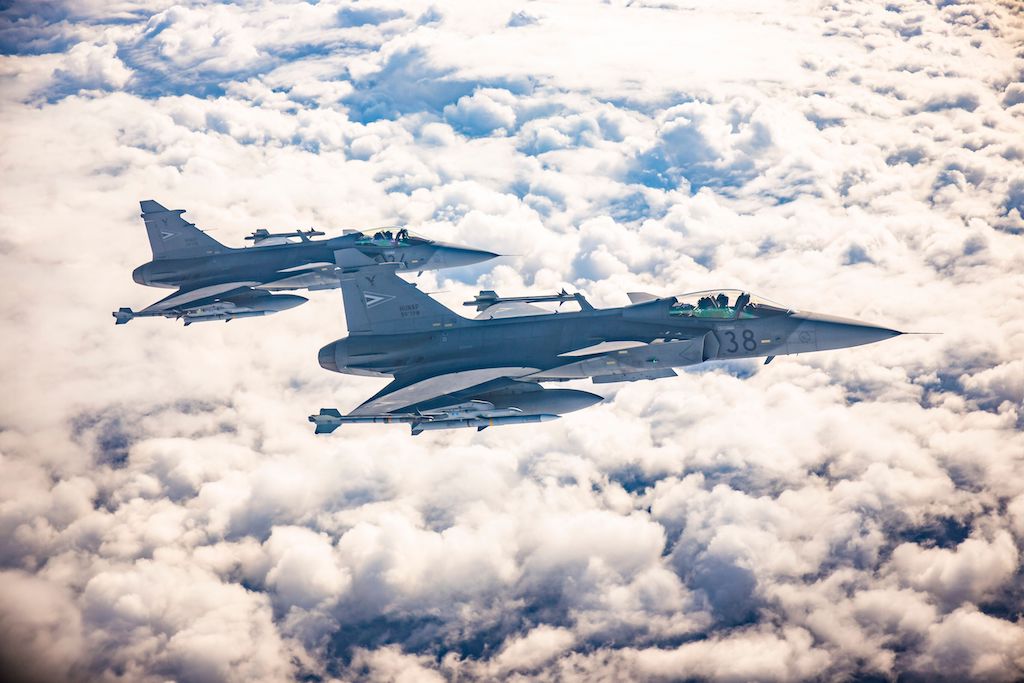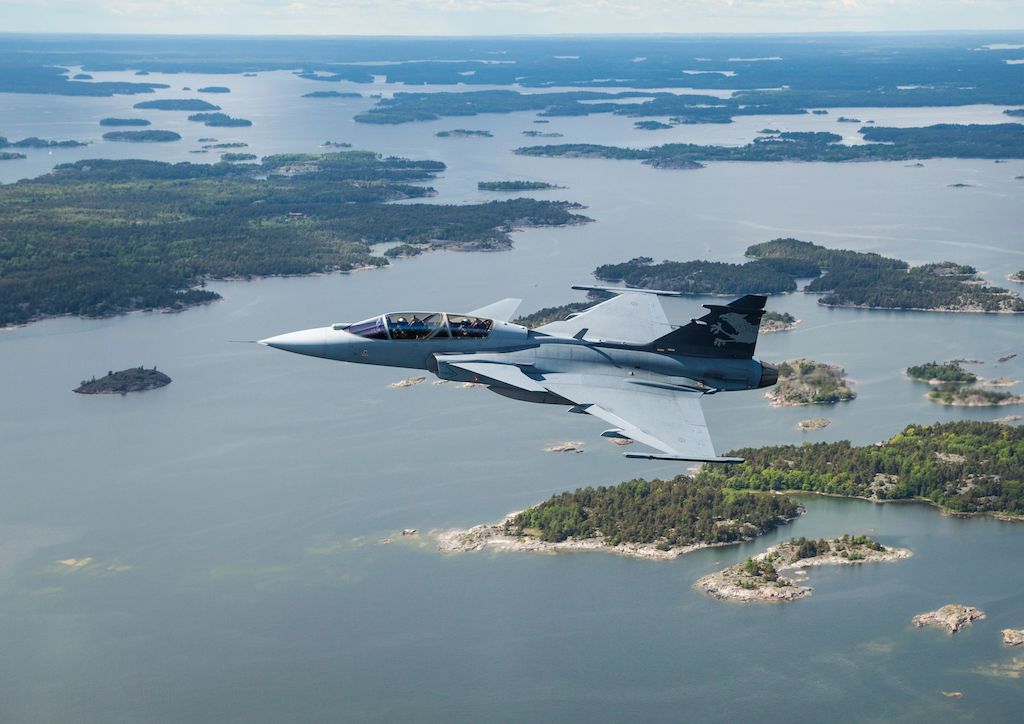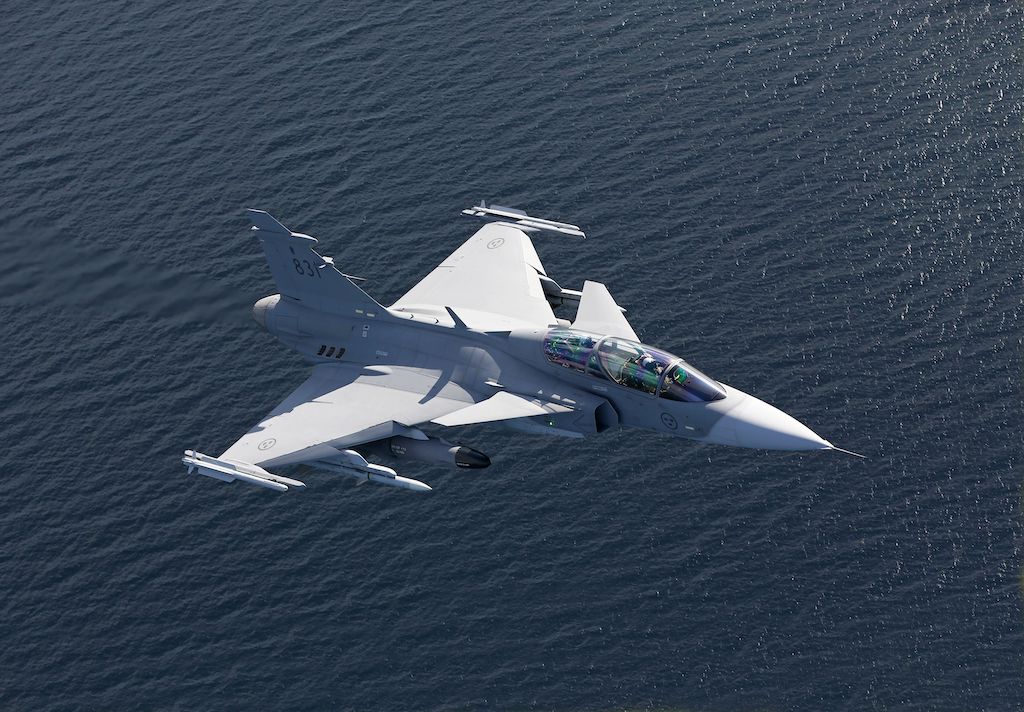Swedes Continue Trying to Sell Gripen Aircraft to Croatia, Ready to Lower Price
February the 4th, 2021 - The Swedes are continuing to try to sell their Gripen aircraft, about which there has been a lot of talk for months now, to Croatia. They're even ready to lower the price even more.
As Poslovni Dnevnik/Darko Bicak writes, after the ad hoc Advisory Interdepartmental Commission for the Procurement of a Multipurpose Fighter Aircraft was submitted to the Croatian Government in mid-December last year, it submitted a "Feasibility Study for the Procurement of a Multipurpose Fighter Plane (VBA)".
Although the Commission was expected to reach a conclusion that the government would then only confirm, possibly seeking Parliament's approval afterwards - as was the case with the last tender in which the Israeli Barak was selected, the conclusion was that the body considered the optimal choice to be the used French Rafale aircraft, and for the new American F-16 Block 70/72. Therefore, a decision was made that there is no decision, and that the responsibility for the choice has now been transferred to the Croatian Government, although it was confirmed that all of the offered aircraft fully meet all Croatian technical and tactical needs.
An offset of one billion euros
As expected, a used Israeli-American F-16 Barak dropped out of the game because it was clear to everyone even before the tender that the offer was meaningless. The reason for this is the previous unsuccessful purchase of that aircraft from Israel, as well as the fact that these are temporary aircraft that would be about 40 years old at the time of delivery to Croatia.
That this was clear to everyone is also showcased by the fact that Israel didn't actually lobby for its planes, and the Americans submitted their offer for the sake of keeping order.
A much bigger surprise was the write-off of the Swedish Gripen aircraft, although it was obvious at the beginning that almost all of the bidders are strong players, some in a geopolitical sense and some in an economic sense, and that any losers could cause some problems in the political and economic global arena. Although it's clear to everyone that the Rafale and F-16s are larger and more powerful, and of course more expensive fighter jets than the Swedish Gripen aircraft, the Swedes are the only ones who have made a concrete offer for economic cooperation with Croatia.
Among other things, in an interview with Poslovni Dnevnik, those at the helm of Saab, the manufacturer of the Gripen aircraft, and the Swedish arms agency FMV, said they were ready to invest half of the total price of the Gripen aircraft into the Croatian economy. If it's known that the basic price of these Gripen aircraft stands at around one billion euros, and the costs of its maintenance, armament and use would be the same, it's clear that the Swedes would invest around one billion euros in Croatia in some form of offset.
The Americans offered cooperation with six unspecified Croatian companies that the F-16 aircraft manufacturer, Lockheed Martin, would include in its global supply chain. In addition to the F-16, the company also produces F-22 and F-35 fighter jets, as well as C-130 Hercules and C-5 Galaxy transport aircraft, and has other missile and space divisions too.
France's offer is the biggest mystery of all. Although in unofficial talks with military officials and other bidders, one may get the impression that the Rafales are the favourites of the Croatian Government, nothing is publicly known about their offer, both in a financial sense with regard to the aircraft, weapons and equipment, nor about about possible reverse economic cooperation or offsets.
A campaign in Brussels
Over recent, semi-official information has been circulating in the public eye, which no one wants to officially comment on, and that's that the Swedes allegedly aren't intending to give up with their Gripen aircraft offer to Croatia easily because they're convinced that the Croatian tender has been rigged.
Namely, the Swedes, according to that source, are allegedly offering Croatia a loan with zero percent interest and a two-year grace period to pay the first installment of the loan. Reportedly, they're ready to lower their current price of 900 million euros for the entire package (aircraft, equipment, weapons, training and logistics). On the other hand, according to that same source, a campaign is planned to be launched in Brussels due to the alleged promotion of one bidder by HDZ.
Alleged ''proof'' of this is offered by the fact that the ruling HDZ newspaper has, in the past, published unsigned ''fan articles'', for which it isn't entirely clear whether they were paid or journalistic, in which the Gripen aircraft and the Swedish offer were apparently ''satanised''.
It's therefore very difficult to say what will happen next in the seemingly endless Gripen aircraft, Croatia-Sweden story, but it is certain that a lowered price will be of interest to some.
For the latest travel info, bookmark our main travel info article, which is updated daily.
Read the Croatian Travel Update in your language - now available in 24 languages.
Gripen Boasts Benefits As Croatian Fighter Jet Saga Continues
December the 7th, 2020 - The saga surrounding Croatia's purchase of fighter jets still isn't over yet. Despite the numerous options on the table from numerous countries, the Swedish offer is looking tempting indeed...
As Poslovni Dnevnik/Darko Bicak writes, we're finally nearing the end of the competition for the selection of new fighter jets for the Croatian Air Force, and Sweden with its Gripen, France with Rafale and the USA, which offers a new F-16 in its own arrangement, and a used Barak with Israel are all competing for Croatia's attention with more or less equal offers.
The decision should be made by mid-December, and the leaders of Saab and FMW explained just why they're so convinced their offer is the best for Croatia. Martensson immediately emphasised that the Gripen is designed to operate in one of the most demanding operational environments in the world, above the unforgiving Baltic sea.
For a relatively small country like Sweden, it is important that the Gripen is cost-effective in the sense of both purchase and use. With the Gripen, he pointed out, Croatia will get first-class capability at a long-term acceptable price, which will meet the requirements of the Croatian Request for Proposal (RFP).
''The Swedish offer is fully in line with the requirements of the Croatian RFP and is a truly comprehensive package that includes all of the elements needed by Croatia in order to manage Gripen aircraft.
All Croatia has to add is its staff, fuel and an air base. Furthermore, the package is offered at a fixed price, and includes support even after the acquisition phase. There will be no hidden or sudden costs. The package containing our offer is of the same type as the one successfully delivered to Hungary and the Czech Republic,'' explained Martensson, adding that although he's still choosing to remain secretive about the specific amounts, that he is convinced that their offer is cost effective, knowing that they offer a comprehensive solution aircraft and support at completely transparent and fixed costs.
FMW pointed out that they're fully prepared to meet all of the Croatian requirements regarding the fighter aircraft delivery deadlines, and that the Czech Republic and Hungary are proof that they are delivering the entire system, including trained and trained pilots and technical staff, within the agreed deadlines.
In response to criticism that the Gripen in the offered version of the C / D is a somewhat outdated aircraft with limited modernisation capabilities, FMW said that it is currently the backbone of the Swedish Air Force and it will be for a long time to come. Additionally, that the needs and operational environment of the Swedish Air Force will require that the Gripen C / D be regularly updated in order to better respond to new threats.
At Saab, they added that this aircraft will be produced with the continuous evolution and upgrading of the system and weapons it can use.
"It's constantly upgrading and adapting to the real situation, in the context of classic and electronic warfare. This setting allows pilots to execute mission objectives, rather than worrying about how to operate the aircraft.
All current operators can confirm the number of regular upgrades that make the Gripen C likely the best available such plane on the market today. The fighter jet will remain operational and competitive for decades to come as the manufacturer keeps all current Gripen C operators in mind, as well as their need to be competitive and use the latest technologies in their homeland security processes,'' emphasised Jonas Hjelm.
On the remark, which can often be heard in public, that Sweden, as a neutral country, is a somewhat risky partner for the supply of weapons to the far more ideologically aligned Croatia (NATO and EU), Martensson reiterated that there have been excellent successes to date. As an EU member, he pointed out, Sweden will respect all obligations towards its partner countries.
When asked whether the Meteor long-range air-to-air missile is part of the Swedish offer to Croatia, FMW diplomatically stated that the Meteor missiles are integrated into the Gripen C / D. However, respecting the process in Croatia, they cannot reveal the details of the offer.
Although classic offset is banned in the EU, some reciprocal industrial cooperation in military orders of this size is inevitable, and the Swedes are aware of that. Saab stated that Swedish companies, including Saab, already operate and have their products here in Croatia.
"To this day, when 50 Swedish companies employ more than 10,000 people in Croatia, I don't remember ever having heard about any failed, non-transparent or overvalued projects that came to Croatia from Sweden. For more than 20 years now, as long as Saab has been present in Croatia, our solutions have been successfully implemented and used in the military and civilian sectors without any problems. Saab's advanced air traffic control and guidance system can be seen at Franjo Tudjman Airport, as well as the Maritime Traffic Monitoring and Control System (VTMIS) which monitors Croatian waters, and a maritime border video surveillance system that enables the identification and surveillance of vessels up to 100 km away,'' said Saab's Vice President Jonas Hjelm.
He added that planned future projects have the opportunity to contribute to the sustainable development of security technologies across Croatia, while retaining valuable competency and knowledge here within the country, which could subsequently become the basis for the potential future establishment of a regional cyber security hub in Croatia. Among other projects, they say, Saab is also ready to transfer knowledge and technology to support the establishment of a Regional Aeronautical Aviation Support Centre right here in Croatia.
''Over time, with the development of capabilities for the maintenance and support of military and commercial aircraft and helicopters, and the parallel development of specific areas of technology related to the establishment of a local supply chain of spare parts and components, Croatia could become a regional hub for the supply, maintenance and support of military and commercial aircraft and helicopters.
This project would lead to long-term cooperation between Saab and the local defense industry, as well as the academic sector, generating around 500 high-tech jobs in the future and returning more than 50% of the total contract value over the life of the aircraft purchased,'' concluded Hjelm.
To the criticism that the Gripen C / D is a good aircraft, but that it may be too expensive considering the possibilities, and compared to, for example, the F-16 and the Rafale, Saab says that the most expensive aircraft is in the one sitting in the hangar.
“If you want to keep a strong air force, your pilots have to fly. They need to be out there in the air. We know that our Gripen customers here in Europe fly more often than other air forces that operate different platforms do (you can compare the Czech Republic and Austria, for example).
He added that the new Gripens don't have the burden of previous use in various conditions and climatic extremes, such as desert countries in Africa and that Croatia gets completely new aircraft with 100% of the resources intended solely for Croatia, without a 15-year history lurking behind them.
''There will be no unexpected repair costs due to earlier mileage. This makes it even more affordable. We expect our Gripen to fly for decades to come - if you decide on a solution other than a new plane, then you have to buy another set of planes in 10 years if you want to keep flying. Another possibility is to have them just for show - but if it doesn't fly, every plane is too expensive to just keep stored in the hangar,'' said Saab's director.
Saab itself pointed out that there is currently significant interest in Gripen around the world, both in South American nations and in other countries, some of which, they claim, are very close to Croatia, but they don't want to talk about such details for now.
Finally, Saab explained that it is difficult to compare prices for fighter jets as they depend on several factors such as the number of aircraft, the equipment, customer-specific solutions, contract terms and related services.
The comparison of the so-called "fly away" or "production cost of one aircraft" rarely provides a good reference basis, and isn't really that important for the customer because it excludes many important elements of the total acquisition and the life cycle cost.
Such a “unit price per aircraft” is also often confused with a more complete “unit price package” which is the total cost of procurement (including all associated support systems, weapons, sensors, services, etc.) divided by the number of aircraft.
"Compared to the latter type of 'price' between different candidates, it's still very much necessary to look at what is really involved," they concluded from Saab.
For the latest travel info, bookmark our main travel info article, which is updated daily.
Read the Croatian Travel Update in your language - now available in 24 languages
Sweden Offers Gripen to Croatia
September 9, 2020 - Today, The Swedish Defence Material Administration submitted its proposal of 12 new Gripen C/D fighter aircraft to Croatia.
Representatives of the Swedish Defence Material Administration (FMV) and the Swedish Embassy in Croatia submitted the proposal from the Swedish government of 12 new Gripen C/D fighter aircraft to the Croatian authorities. Parallel to the government’s proposal, Saab is offering a tailored made strategic cooperation package that will boost the Croatian defence industry, and benefit Croatian security by building a long-term partnership with strategic sectors.

“Sweden and Saab are offering a comprehensive and long-term solution for Croatian homeland security that will protect Croatia’s people and borders for decades to come. If Croatia chooses Gripen, Saab is ready to transfer know-how and technology and establish a Regional Aeronautical & Support Service Centre in Croatia. This would develop long term cooperation with local defence industry as well as the academic sector, generating some 500 high-tech jobs,” says Jonas Hjelm, Senior Vice President and head of Saab business area Aeronautics.

Gripen C/D is a modern and proven multi-role fighter that uses the latest technology and performs an extensive range of air-to-air, air-to-ground and reconnaissance missions. The aircraft is in operational service with the air forces of Sweden, Hungary, the Czech Republic, South Africa and Thailand.

Gripen fighters of the Czech and Hungarian Air Forces participate regularly in NATO operations and exercises, proving the fighter’s full NATO interoperability.
Gripen C/D stays ahead of its opponents through an on-going evolution of its systems and the weapons it can use, and the fighter will remain operational for decades.
For further information, please contact:
Saab Press Centre,
+46 (0)734 180 018,
This email address is being protected from spambots. You need JavaScript enabled to view it.
Twitter: @Saab
Facebook: @Saabtechnologies
LinkedIn: Saab
Instagram: Saab
Youtube: SaabGroup
Saab serves the global market with world-leading products, services and solutions within military defence and civil security. Saab has operations and employees on all continents around the world. Through innovative, collaborative and pragmatic thinking, Saab develops, adopts and improves new technology to meet customers’ changing needs.
For the latest travel info, bookmark our main travel info article, which is updated daily.
Read the Croatian Travel Update in your language - now available in 24 languages


